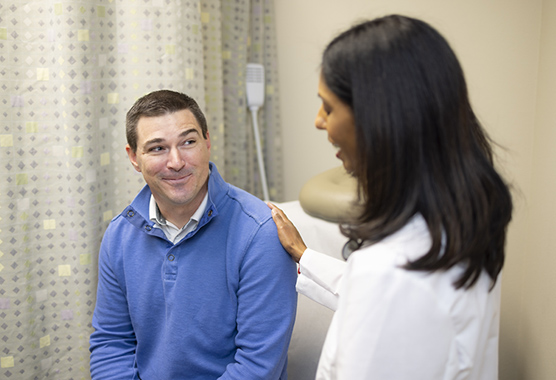Multiple Myeloma
Multiple myeloma is a rare disease. Our experience in treating this cancer can result in better outcomes for you.
Medically reviewed by Primo Lara, M.D. on Jan. 08, 2024.

What Is Multiple Myeloma?
Multiple myeloma is a type of cancer that starts in the plasma cells inside the bone marrow. Plasma cells play a key role in your immune system, helping to fight infection and disease.
Our Multiple Myeloma program is part of UC Davis Comprehensive Cancer Center. The specialists who treat these types of cancer are experts in the field.
We use the most advanced methods to accurately diagnose and effectively treat multiple myeloma. Our doctors are at the forefront of research for new therapies. That means you have access to the most innovative treatments possible.
Symptoms of Multiple Myeloma
Multiple myeloma often produces no symptoms in its early stages. As the disease progresses, people may experience issues related to their bones, blood counts, kidney function and/or nerve function.
Common Symptoms
- Bone pain (typically in the back or ribs)
- Bone weakness or fractures
- Bruising
- Fatigue
- Fever
- Trouble breathing
- Weakness in arms or legs
Causes and Risk Factors for Multiple Myeloma
Age
Most people diagnosed with multiple myeloma are at least 45 years old. The risk tends to increase with age.
Biological Sex
Multiple myeloma is slightly more common in men than in women.
Race
Black people are nearly twice as likely as white people to develop multiple myeloma.
Family History
Having a parent or sibling with the disease increases your risk.
Diagnosis and Testing of Multiple Myeloma
A comprehensive blood test can reveal some possible indicators of multiple myeloma. A low red blood cell count (anemia) or high creatinine levels can be signs of multiple myeloma. Blood and urine tests can measure levels of myeloma protein.
If these tests — and any symptoms you have — suggest multiple myeloma, your doctor may do a bone marrow biopsy. Typically, they use a needle inserted into the back of the pelvic bone to remove a small sample of bone marrow. Testing the bone marrow can confirm a multiple myeloma diagnosis.
Multiple Myeloma Treatments
The best treatment for multiple myeloma depends in part on your age, overall health and stage of the disease. We use the most advanced treatments for all stages of multiple myeloma. Our network of clinical trials also provides you with access to new drugs and therapies not readily available elsewhere.
Chemotherapy
Chemotherapy uses medications (delivered by IV or taken orally) to shrink tumors and destroy cancer cells.
Radiation
Radiation therapy delivers high-energy rays directly to the bones damaged by multiple myeloma.
Stem Cell Transplant
A stem cell transplant replaces your unhealthy stem cells with healthy ones. Our Division of Malignant Hematology/Cellular Therapy and Transplantation offers the latest and most effective treatments. If you have multiple myeloma, we typically use your own healthy stem cells rather than from a donor. This process is sometimes called a bone marrow transplant.
Targeted Therapy
Targeted therapy (sometimes called precision medicine) uses medication to target cancerous cells.
Immunotherapy
Immunotherapy drugs use your own immune system to recognize and attack cancer cells. Car T-cell therapy is one type of immunotherapy often used to treat multiple myeloma.
There is a
1 in 132Lifetime risk of multiple myeloma
Source: American Cancer Society: Key Statistics About Multiple Myeloma
Request an Appointment
As Sacramento's No. 1 hospital, you'll benefit from unique advantages in primary care and specialty care. This includes prevention, diagnosis and treatment options from experts in 150 specialties.
Referring Physicians
To refer a patient, submit an electronic referral form or call.
800-4-UCDAVIS
Patients
Call to make an appointment.
Consumer Resource Center
800-2-UCDAVIS

Ranked among the nation’s best hospitals
A U.S. News & World Report best hospital in cardiology, heart & vascular surgery, diabetes & endocrinology, ENT, geriatrics, neurology & neurosurgery, and pulmonology & lung surgery.

Ranked among the nation’s best children’s hospitals
U.S. News & World Report ranked UC Davis Children’s Hospital among the best in pediatric nephrology, orthopedics*, and pulmonology & lung surgery. (*Together with Shriners Children’s Northern California)

Ranked Sacramento’s #1 hospital
Ranked Sacramento’s #1 hospital by U.S. News, and high-performing in aortic valve surgery, back surgery (spinal fusion), COPD, colon cancer surgery, diabetes, gynecological cancer surgery, heart arrhythmia, heart failure, kidney failure, leukemia, lymphoma & myeloma, lung cancer surgery, pacemaker implantation, pneumonia, prostate cancer surgery, stroke, TAVR, cancer, orthopedics, gastroenterology & GI surgery, and urology.

The nation’s highest nursing honor
UC Davis Medical Center has received Magnet® recognition, the nation’s highest honor for nursing excellence.

World-class cancer care
One of ~59 U.S. cancer centers designated “comprehensive” by the National Cancer Institute.

A leader in health care equality
For the 13th consecutive year, UC Davis Medical Center has been recognized as an LGBTQ+ Healthcare Equality Leader by the educational arm of America’s largest civil rights organization.

